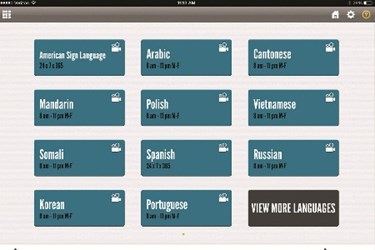Stratus Video Interpreting Offers Online Access To Medical Interpretation Services For Limited English Proficiency (LEP) Patients With Ebola And Other Infectious Diseases

Video remote interpreting (VRI) company Stratus provides a critical service for Ebola preparedness plans, enabling limited English proficiency (LEP) patients with infectious diseases to communicate through certified medical interpreters via tablet computers.
Following the recent Ebola epidemic in West Africa and subsequent cases treated in the United States, many American healthcare facilities are establishing and implementing infectious disease protocols as part of a formal Ebola preparedness plan. Among the considerations that should be addressed in such plans are interpretation services (http://www.stratusvideo.com/healthcare-interpreter-services-overview/) for deaf, hard-of-hearing and limited English proficiency (LEP) patients with infectious diseases. To that end, Stratus Video Interpreting (http://www.stratusvideo.com/) offers a solution that provides access to trained and certified healthcare interpreters while limiting exposure to infected individuals.
According to the Census Bureau, 20.8% of U.S. residents (more than 61.5 million people) speak a language other than English at home, with 40.7% of that population (over 25 million individuals) speaking English “less than very well” (1). “Given the substantial LEP population currently residing in the United States, and considering that infectious diseases like Ebola can be brought into the country by foreign nationals from disease-endemic regions, it’s critical for healthcare providers to have immediate access to interpretation services to promptly diagnose, treat and minimize the spread of highly contagious diseases,” said Sean Belanger, CEO of Stratus Video Interpreting.
When patients with infectious diseases like the Ebola virus are admitted to a healthcare facility, government-recommended protocols include isolating the patient, requiring healthcare workers to wear personal protective equipment (PPE) and restricting visitor access (2). To prevent the spread of contagious diseases, hospitals often limit patient interaction to a small number of medical personnel who have been trained in the proper use of PPE and environmental infection control measures. In such instances where face-to-face interpretation may not be practical or advisable, video remote interpreting (http://www.stratusvideo.com/) (VRI) services have emerged as a viable solution.
“When a case of the Ebola virus or other infectious disease is suspected, time is of the essence in diagnosing, quarantining and treating the patient,” asserted Belanger. “With video remote interpreting, doctors can connect to a trained and certified medical interpreter in 30 seconds or less and avoid having to wait for a face-to-face interpreter to travel to the facility and don protective gear.”
Video-based interpretation services are a highly expedient and affordable complement to face-to-face interpreters. While the cost of face-to-face interpreters can vary widely depending on the language and geographic location, the International Medical Interpreters Association (IMIA) found that approximately one-third of per-diem medical interpreters earn between $30-$50 per hour, and nearly 15% earn upwards of $50 per hour (3). By contrast, Stratus Video Interpreting charges by the minute and only for the actual minutes used, so healthcare providers can connect to a translator as and when needed. But despite the cost discrepancy, Stratus encourages healthcare facilities to keep face-to-face interpreters as person-to-person communication is invaluable, and to supplement traditional interpretation services with VRI for time and safety savings during crises.
Stratus’ video remote interpreting services are accessible via PCs, laptops, tablets, smartphones, videoconferencing systems and other video-enabled devices. Unlike over-the-phone interpreting services, Stratus’ interpreters can respond to LEP patients’ non-verbal cues and deaf patients can communicate via sign language. When treating patients with highly infectious diseases like the Ebola virus, Stratus recommends using an inexpensive Android tablet that can be discarded as medical waste in the event it is contaminated by infected blood or other bodily fluids.
Healthcare providers and administrators who are interested in incorporating video remote interpreting as part of an Ebola preparedness plan can learn more about Stratus interpretation services at www.stratusvideo.com.
About Stratus Video Interpreting:
Stratus Video Interpreting provides on-demand interpreter services by using technology to connect clients with interpreters in over 175 spoken and signed languages in less than 30 seconds. Stratus’ cloud-based video solution delivers an array of unique features to virtually any Internet-enabled PC, Mac, smartphone or tablet. Stratus clients use the technology to connect with their own staff interpreters, as well as with Stratus interpreters, who have years of healthcare and courtroom experience and hold multiple certifications. With Stratus, state-of-the-art video remote interpreting is made available with virtually no capital investment. Stratus averages 65,000 video calls a day, up from 40,000 in mid-2013. Stratus Video is the sister company of The Z® (CSDVRS, LLC, dba ZVRS), which was established in 2006 and developed by and for deaf and hard-of-hearing individuals, setting the industry standard as the nation’s premier Video Relay Service Provider and the first VRS Provider to receive a 5-year certification from the FCC. In 2014, Stratus was recognized as one of the fastest-growing privately held companies, ranking #3,827 on Inc. magazine’s Inc. 5000 list.
1.U.S. Census Bureau. “Language Spoken at Home”; 2013 American Community Survey 1-Year Estimates; reports generated via American FactFinder; accessed November 18, 2014. factfinder2.census.gov
2.Centers for Disease Control and Prevention. “Safe Management of Patients with Ebola Virus Disease (EVD) in U.S. Hospitals”; last updated November 16, 2014; accessed November 18, 2014. www.cdc.gov/vhf/ebola/hcp/patient-management-us-hospitals.html
3.International Medical Interpreters Association. “Compensation Results for Per-Diem Interpreters”; 2010 IMIA Compensation Survey – Executive Summary; page 7; accessed November 18, 2014. www.imiaweb.org/uploads/presentations/2010_46.pdf
Source: Stratus Video Interpreting
